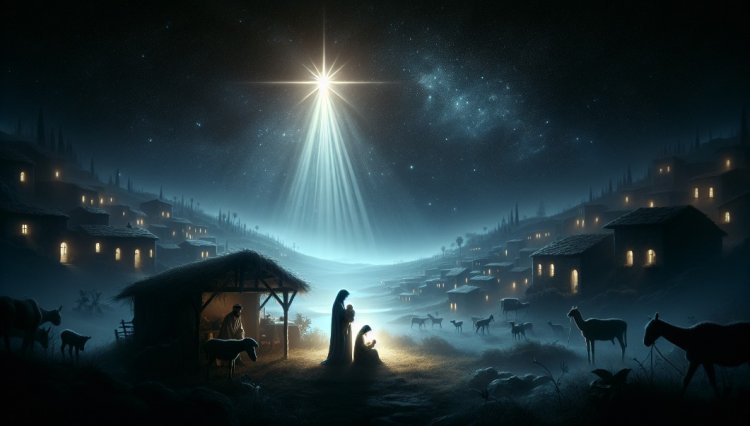Why the Nativity? Understanding the Meaning and Significance of the Birth of Jesus
Meta Description: Unwrap the true meaning of Christmas! Journey through the history and significance of the Nativity, from the humble manger to the transformative symbol of hope, faith, and love

Why the Nativity? Understanding the Meaning and Significance of the Birth of Jesus
Okay, my name is Abe Abrams, and if you call me by any other name, say you are calling me Johny Bravo. I am not going to turn back and listen to you.
Our good Lord's name is not Jesus; his real name is "Yahushua."
Mary is not Mary; she is Miriam!
And our good God's name is Ehyeh Asher Ehyeh (I am that I am).
Introduction
The world is about to change forever. The birth of Jesus, known as the nativity, is a crucial event in history. It holds immense importance and significance for Christians around the world. But why should we care about the birth of Jesus? Why does it matter?
By using scripture and our imagination, we can gain a deeper understanding of the nativity. The nativity is not just another historic event or a fairy tale from childhood. It marks the beginning of our redemption. It is the moment when God sent His Son, Jesus, to offer hope and a better future to the world.
Through the nativity, we can see God's love and plan for humanity. It is a reminder that God chose to enter the world as a baby, born to a virgin in Bethlehem. This humble and miraculous birth shows us that God is with us, Immanuel.
As we explore the nativity, let us travel back in time to a faraway place and imagine the people, places, and circumstances that were a part of this extraordinary event. Let us discover the mystery, meaning, and deeper significance of the nativity.
The Foretaste of a Better Future
God sent prophets to offer hope to a weary world, and their prophecies were fulfilled in the birth of Jesus. Over 300 Old Testament prophecies pointed to the coming of the Messiah, and the first fulfillment took place in Bethlehem. This small town became the birthplace of Jesus, the Saviour of the world.
Bethlehem holds great significance because it was the birthplace of Jesus, the Son of God. It was in this humble and miraculous setting that God chose to enter the world. Jesus' birth in Bethlehem shows us that God is with us, Immanuel. This simple and unassuming town became the starting point of our redemption and the beginning of a better future.
-
God sent prophets to offer hope to a weary world.
-
Over 300 Old Testament prophecies were fulfilled in the birth of Jesus.
-
The first fulfillment of these prophecies took place in Bethlehem.
-
Bethlehem holds significance as the birthplace of Jesus, the Saviour.
The nativity is a reminder of God's love and plan for humanity. It is a foretaste of a better future, where joy, hope, and peace can be found even amid difficult circumstances. The birth of Jesus in Bethlehem is a testament to God's faithfulness and his desire to bring redemption to all people. Let us rejoice in the nativity and embrace the hope it offers for a better future.
Joseph and Mary: Chosen to Raise God's Son
Joseph and Mary were an ordinary couple from the unremarkable town of Nazareth. Their families set them up as a betrothed couple who would marry each other. Joseph was a practical man, a carpenter by trade, while Mary was known for her godliness and obedience to God's will.
Their lives took an unexpected turn when Mary received a visit from the angel Gabriel, who informed her that she would conceive a son by the Holy Spirit and give birth to the Saviour of the world. Mary, despite her initial fear, humbly accepted God's plan for her life, saying, "Let it be to me according to your word."
Joseph, upon learning of Mary's pregnancy, was understandably troubled. However, an angel appeared to him in a dream, assuring him that Mary's child was from the Holy Spirit and that he should take her as his wife. Joseph, being a just and honorable man, obeyed God's command and took Mary into his home.
Together, Joseph and Mary embarked on a journey to Bethlehem, Joseph's ancestral hometown, to be registered for the Roman census. Despite the challenges they faced along the way, they remained faithful to God's plan. When they arrived in Bethlehem, they found no room in the inn and were forced to take shelter in a humble stable.
It was in that lowly stable that Mary gave birth to Jesus, the Son of God. The miraculous birth of Jesus in Bethlehem fulfilled prophecies and marked the beginning of God's redemption plan for humanity. Joseph and Mary, chosen by God to raise His Son, played a vital role in the nativity and the salvation of the world.
Mary's Surrender
Mary's acceptance of God's will was evident in her humble response to the angel Gabriel. Despite her initial fear, she willingly surrendered herself to God's plan for her life, saying, "Let it be to me according to your word." Mary's faith in God's strength allowed her to trust that He would guide and provide for her in this extraordinary situation.
The mystery of the virgin birth was a testament to Mary's role in God's divine plan. It was through her obedience and faith that God chose her to be the vessel through which His Son would enter the world. This miraculous event defied human understanding and demonstrated the power and sovereignty of God.
Mary's role in providing a home for God's Son cannot be underestimated. As the mother of Jesus, she nurtured and protected him, creating a loving and safe environment for him to grow and fulfill his purpose. Mary's willingness to embrace her role as the mother of the Messiah played a vital part in God's redemptive plan for humanity.
Joseph's Faithful Decision
When Joseph first learned of Mary's pregnancy, he was shocked and disbelieving. Understandably, he was troubled and unsure of what to do. However, Joseph's compassion and love for Mary led him to make a decision not to disgrace her publicly. Instead, he decided to quietly break off their engagement.
But then Joseph had a dream. In this dream, an angel appeared to him and reassured him that Mary's child was conceived by the Holy Spirit. The angel commanded Joseph to take Mary as his wife and raise the child as his own. Joseph, being a just and honorable man, obeyed God's command without hesitation.
Joseph's obedience to God's command was a testament to his faith and trust in God. He put aside his own doubts and fears and chose to embrace God's plan for him and Mary. Joseph became the earthly father to the Christ's child, providing love, care, and guidance as Jesus grew into adulthood.
Joseph's faithful decision played a crucial role in the nativity and the salvation of the world. He willingly embraced the responsibility of raising the Son of God, knowing that he was fulfilling a divine purpose. Through Joseph's obedience, God's plan for the redemption of humanity was set into motion.
The Perfect Time and Message
The birth of Jesus in the Roman Empire happened at the perfect time. The world was weary, craving hope and a better future. The Roman Empire ruled with an iron fist, dominating through fear and violence. Jesus' birth brought a message of hope, peace, and love to a world in desperate need.
By choosing to enter the world as a baby, born to a virgin in Bethlehem, God displayed His love and plan for humanity. The contrast between Rome's domination and Jesus' teachings was stark. While Rome sought power and control, Jesus taught humility, compassion, and forgiveness.
Jesus' message was radical and wonderful. He taught that love could conquer hate, that forgiveness could bring healing, and that joy could be found even amid difficult circumstances. His teachings challenged the status quo and called for a radical transformation of hearts and minds.
Through the nativity, we see the perfect timing of Jesus' birth in the Roman Empire and the powerful message of hope, peace, and love that he brought. It is a reminder that, even in the darkest of times, there is always hope. The nativity invites us to embrace the radical and wonderful message of Jesus and to find comfort and inspiration in his teachings.
The journey to Bethlehem
The journey to Bethlehem was not an easy one for Mary and Joseph. It was prompted by Roman taxation, which required them to travel to Joseph's ancestral hometown to be registered. This journey would have been challenging and dangerous, especially for a pregnant Mary.
They faced the harsh realities of traveling on foot, enduring long distances and difficult terrain. The journey would have been physically exhausting and emotionally draining for both Mary and Joseph.
However, they were not alone in their journey. They received support and blessings from friends and family along the way. Their loved ones provided them with provisions, encouragement, and prayers. This support helped sustain them during their challenging journey to Bethlehem.
The significance of Bethlehem as the birthplace of Jesus cannot be overstated. Bethlehem was the fulfillment of numerous Old Testament prophecies and held great symbolic meaning. It was the birthplace of the Saviour, the Son of God, who came to bring hope, redemption, and salvation to the world.
Despite facing challenges and dangers, Mary and Joseph's journey to Bethlehem was a testament to their faith and obedience to God's plan. It serves as a reminder of the importance of trusting in God's guidance and provision, even amid difficult circumstances.
The Humble Birth
The birth of Jesus took place in a humble setting—a stable in Bethlehem. Instead of being born in the comfort of an inn, Jesus entered the world amid animals and hay. This humble setting symbolized the humility and simplicity that Jesus would embody throughout his life.
God purposefully chose a stable instead of an inn to emphasize the humble nature of Jesus' birth. It was a deliberate decision to show that God's kingdom does not operate according to worldly standards of power and wealth. The King of Kings was born in the most lowly and unexpected place.
The symbolism of Jesus' homelessness is profound. It reminds us that Jesus came to identify with the poor, the marginalized, and the outcasts. He experienced what it was like to have no place to lay his head, and his birth in a stable foreshadowed his future ministry among the homeless and the destitute.
Furthermore, the humble birth of Jesus points to the future promise of opening the doors of heaven. Just as Jesus was born in a lowly stable, he would later open the doors of eternity for all who believe in him. Through his birth, death, and resurrection, Jesus offers us the hope of eternal life and the promise of a better future.
The Shepherds' Witness
The shepherds' unexpected presence at the nativity is a testament to the inclusivity of Jesus' birth. They were society's outcasts, working in fields away from the bustling city. Yet, they were chosen to witness and celebrate the birth of the Saviour. This shows that God's love and grace extend to all, regardless of their social status.
When the angelic announcement came, the shepherds wasted no time in responding. They immediately left their sheep and journeyed to Bethlehem to find the baby Jesus. Their obedience and faithfulness serve as an example to us all. They were willing to leave their comfort zone and follow the call of God.
The shepherds' worship of Jesus is significant because it demonstrates that no one is too lowly or unworthy to worship the Son of God. Their simple act of bowing down and offering their praises shows that true worship comes from the heart, regardless of external circumstances.
In a world that often values wealth, power, and social status, the shepherds remind us that God's kingdom is different. It is a kingdom where the last will be first and the humble will be exalted. The shepherd's witness challenges us to reevaluate our priorities and embrace the humble and inclusive message of the nativity.
The Arrival of the Wise Men
The mystery and wonder of the wise men
The wise men, also known as the Magi, were a group of astrologers who studied prophetic literature and celestial signs. They were highly respected in their respective cultures and were known for their wisdom and knowledge. Their arrival in Bethlehem created a sense of awe and anticipation, as people wondered who these mysterious men were and what their purpose was.
Their study of prophetic literature and celestial signs
The wise men were well-versed in the ancient prophecies that foretold the coming of a great king. They carefully studied the scriptures and compared them to the signs they observed in the night sky. They recognized the significance of the star that appeared and believed it to be a sign of the birth of the long-awaited Messiah.
The meaning of the star and its significance
The star that led the wise men to Bethlehem holds great significance. It represented the fulfillment of ancient prophecies and served as a guiding light for wise men. The star symbolized hope, guidance, and the divine presence. It was a sign from God, directing them to the birthplace of the King of the Jews.
Their recognition of Jesus as the King of the Jews
When the wise men arrived in Bethlehem and saw the child Jesus, they fell down and worshipped him. They recognized him as the long-awaited King of the Jews and presented him with gifts fit for a king: gold, frankincense, and myrrh. Their worship and recognition of Jesus' divine status further emphasized the significance of his birth.
The Worship of the Newborn King
As the shepherds left the stable that night, they couldn't contain their excitement. They had witnessed the birth of the long-awaited Messiah, the Saviour of the world. Their hearts were filled with joy and wonder as they made their way back to their flocks, spreading the good news to everyone they encountered. The shepherds' visitation to the newborn King was just the beginning of the worship that would follow.
Soon after, a group of wise men, also known as the Magi, from the East arrived in Bethlehem. They had traveled a great distance to honor the Jewish King under the guidance of a miraculous star. These learned men were respected in their cultures for their wisdom and knowledge. Their arrival created a sense of awe and anticipation, as people wondered who these mysterious men were and what their purpose was.
The gifts they presented to Jesus were significant. Gold, frankincense, and myrrh were not just random offerings but symbols of Jesus' identity and purpose. Gold represented his kingship, frankincense symbolized his deity, and myrrh foreshadowed his sacrificial death. Through their gifts, the wise men affirmed Jesus as the Christ, the Messiah.
The honor given to Jesus as King and the worship offered by the shepherds and the wise men emphasize the significance of his birth. The nativity is a reminder that Jesus came into the world to save humanity from their sins and to offer hope and salvation to all people. It is a testament to God's love and his desire to reconcile humanity to himself.
The worship of Jesus holds great significance for believers today. It reminds us of the hope, peace, and joy that Jesus brings into our lives. It challenges us to surrender ourselves to God's plan and to offer our worship, just as the shepherds and the wise men did. The nativity invites us to embrace Jesus as our King and Saviour and to live in light of his love and grace.
The Meaning and Relevance of Today
The nativity, the birth of Jesus, continues to have a lasting impact on both Christians and non-Christians alike. It is a significant event in history that holds immense importance and relevance in today's world.
One of the key aspects of the nativity is the message of joy, hope, and peace that Jesus brought into the world. In a world filled with challenges, difficulties, and uncertainty, the nativity offers a reminder that there is hope and a better future available through Jesus. It is a source of comfort and inspiration for those seeking joy, hope, and peace in their lives.
The nativity also awakens our understanding of the need for a Saviour. It reminds us that we are all in need of redemption and that Jesus came to offer salvation to all people. This realization can lead to a personal transformation and a willingness to surrender our lives to Jesus.
By giving our lives to Jesus, we can experience a fresh start. The nativity represents a new beginning, a chance to leave behind our past mistakes and embrace the forgiveness and grace offered by Jesus. It is an invitation to start anew and live a life aligned with God's plan and purpose.
Overall, nativity continues to hold meaning and relevance today by reminding us of God's love, offering us hope in difficult times, awakening us to the need for a Saviour, and providing an opportunity for a fresh start in our lives.
Conclusion
The nativity is a life-changing event that holds immense importance and significance for Christians around the world. It is not just another historic event or a fairy tale from childhood. The birth of Jesus marks the beginning of our redemption and offers hope for a better future.
Through the nativity, we see the love of God revealed through Jesus. God chose to enter the world as a baby, born to a virgin in Bethlehem, to offer salvation to all people. It is a reminder that God is with us, Immanuel.
All people are invited to accept Jesus as their Saviour and experience the love and forgiveness that he offers. The nativity represents God's desire to reconcile humanity to himself and bring redemption to all people.
Ultimately, the nativity serves as a reminder of God's incredible love for the world. It is a powerful symbol of hope, peace, and joy, even in the midst of difficult circumstances. Let us embrace the nativity and the message it brings, and let it inspire us to live in light of God's love and grace.



 admin
admin 










